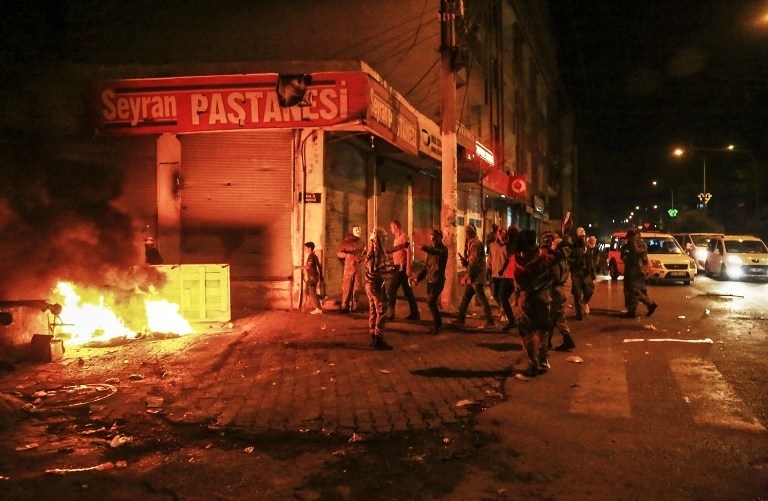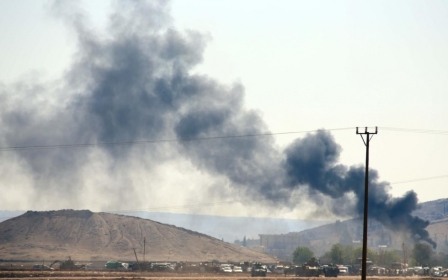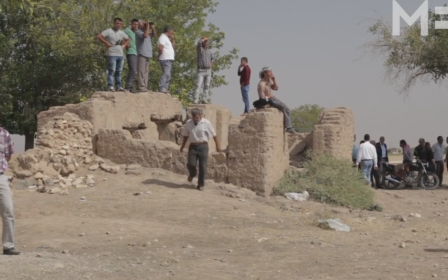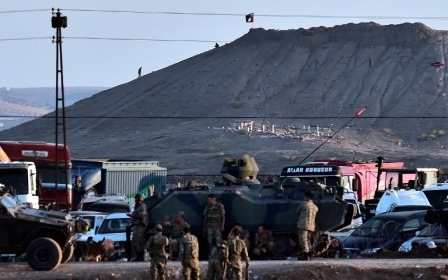14 dead in Turkey as Kobane brings pro-Kurdish protesters to streets

Pro-Kurdish demonstrators, angered by Turkey's lack of action in the fight against Islamic State militants on the Syrian border, clashed with police across the country on Tuesday. At least 14 people have been killed and dozens more injured across Turkey since the protests broke out yesterday, AP reported.
The street protests in Turkey that killed at least 14 as of early Wednesday echoed the calls of hundreds of Kurds who watched the battle over Kobane from the Turkish-Syria border town of Mursitpinar in an emotional scene on Tuesday.
The three-week long IS assault on Kobane has put Turkey in a precarious political situation. Either the country can arm the Kurdish forces battling IS in Kobane, and risk weapons falling into the hands of PKK fighters who Turkish officials have said are as much an enemy as IS. Or it can risk the growing anger of Kurds and their supporters who took to the streets in Turkey and Europe on Tuesday night - as well as the European Parliament in Brussels - to demand that the international community end what some protesters and politicians are calling a genocide.
Added to this double-edge sword are the country's domestic security concerns and reports of active IS recruitment among Turkey's population - which some would argue is blowback after the country turned a blind eye on militants crossing through its borders to Syria. US Vice President Joe Biden told an audience at Harvard University last week that Turkish President Recep Tayyip Erdogan had admitted letting in "too many people through" in reference to the thousands of militants who are suspected of having crossed its borders.
"I have never said to him that we had made a mistake, never," Erdogan responded. Biden subsequently was forced to apologise for his comments.
As the fall of Kobane to IS fighters looked increasingly likely, Washington and its Arab allies stepped up air strikes on Monday and Tuesday. The Pentagon said the strikes near the town had damaged or destroyed several armed vehicles, anti-aircraft artillery and a tank.
"[The US] is targeting and bombing and they don't know what they're bombing," Semo said. "Even if they don't want to provide [the Kurdish fighters] with weapons, they can at least cooperate with them to get information on the whereabouts of [Islamic State]."
Turkish officials have repeatedly warned that the fall of Kobane could mean an end to the peace talks between Ankara and the PKK, which waged a deadly insurgency in Turkey for the last three decades, but has largely observed a ceasefire since 2013.
Jailed PKK leader Abdullah Ocalan said in a message, relayed by his brother from his prison on the island of Imrali on the Sea of Marmara, that the government had until mid-October to show it was serious about the peace process.
"They [the government] are talking about resolution and negotiation but there exists no such a thing.
"This is an artificial situation we will not be able to continue anymore," said the statement carried by the Firat news agency.
"The state must take action... Can a peace process make any progress in this way?"
Combustible Turkey?
An estimated 180,000 Kurdish refugees have fled from Syrian into neighbouring Turkey in the past three weeks during the IS assault on Kobane, adding to the 1.2 million Syrian refugees already in the country.
As in Lebanon, Turkey has recently witnessed protests and violence against Syrians in the country, most of whom have landed in Turkey's cities and will be competing with locals for jobs with many willing to take lower wages.
The pressure of the refugees, added to forces set into momentum after last year's nationwide protests sparked by plans to redevelop Istanbul's Gezi Park and now the nationwide pro-Kurdish demonstrations, raise questions about whether Turkey could be tipping towards a combustible situation with Kobane.
In protests on Tuesday, one young pro-Kurdish protester was killed in the southeastern city of Mus, while police used tear gas and water canon to disperse angry protests in Istanbul.
There were conflicting reports about how the 25-year-old protester was killed in the clashes in the city of Mus, with the Hurriyet newspaper saying he died of a gunshot wound after being caught in crossfire.
But NTV television said he was killed after being struck in the head by a tear gas cannister fired by police to disperse the protesters.
In Diyarbakir, Turkey's largest Kurdish city in the southeast, two people were killed and 10 others were injured after Islamist groups opened fire on demonstrators.
Turkey's main pro-Kurdish party, the People's Democratic Party (HDP), late Monday called for street protests "against IS attacks and the AKP's stance on Kobane".
Almost all shops were closed in Mus, where dozens of youths set fire to bins and lit smoke bombs and firecrackers. Another person was seriously injured.
In Istanbul's Gazi neighbourhood, largely populated by Kurds, police used tear gas and water cannon to disperse a protest by several hundred Kurds Tuesday afternoon, an AFP correspondent reported.
Elsewhere in Istanbul, one person was seriously injured in the Sarigazi district after being shot in the head from close range.
In another protest Tuesday afternoon in the Kadikoy neighbourhood on the Asian side of Istanbul, human rights lawyer Tamer Dogan was badly wounded after being hit in the head by a tear gas canister fired by a policeman, the Radikal news website said.
Clashes also took place in the Turkish capital Ankara, with several police injured in the protests.
Kurdistan Communities Union (KCK) - considered the urban wing of the mountain-based PKK - called on "millions" to take to the street to protest against "IS brutality".
In the southeastern city of Batman, PKK supporters set fire to a dormitory and a prep school after clashing with police.
In Hakkari on the border with Iraq and Iran, the youth wing of the PKK attacked a girls' dormitory, ransacking its rooms and some of the offices, reports said.
A curfew has been declared in two Turkish provinces, according to Hurriyet Daily News. The Turkish daily said the curfew was announced at 5pm local time (0200 GMT) in the south-east province of Mardin, near to the border with Syria and in the Ercis district of eastern province Van.
New MEE newsletter: Jerusalem Dispatch
Sign up to get the latest insights and analysis on Israel-Palestine, alongside Turkey Unpacked and other MEE newsletters
Middle East Eye delivers independent and unrivalled coverage and analysis of the Middle East, North Africa and beyond. To learn more about republishing this content and the associated fees, please fill out this form. More about MEE can be found here.





